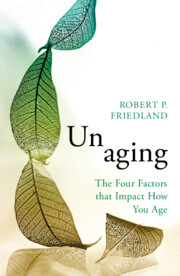Book contents
- Unaging
- Reviews
- Unaging
- Copyright page
- Dedication
- Contents
- List of Figures and Tables
- Preface
- Part I Foundations: What Do We Need to Know about Optimal Aging?
- Part II Applications: What Can We Do about the Opportunity of Aging?
- 12 Overview
- 13 Physical Activity
- 14 Whole Body Health
- 15 Mental Activity
- 16 Psychological Measures
- 17 Social Factors
- 18 Dealing with Stress
- 19 Sleep
- 20 Diet
- 21 Microbial Considerations
- 22 Dental Care
- 23 Dealing with Doctors and Drugs
- 24 Hazardous Behaviors
- 25 Toxic Exposures
- Part III Conclusions
- Acknowledgments
- Glossary
- References
- Index
18 - Dealing with Stress
from Part II - Applications: What Can We Do about the Opportunity of Aging?
Published online by Cambridge University Press: 15 September 2022
- Unaging
- Reviews
- Unaging
- Copyright page
- Dedication
- Contents
- List of Figures and Tables
- Preface
- Part I Foundations: What Do We Need to Know about Optimal Aging?
- Part II Applications: What Can We Do about the Opportunity of Aging?
- 12 Overview
- 13 Physical Activity
- 14 Whole Body Health
- 15 Mental Activity
- 16 Psychological Measures
- 17 Social Factors
- 18 Dealing with Stress
- 19 Sleep
- 20 Diet
- 21 Microbial Considerations
- 22 Dental Care
- 23 Dealing with Doctors and Drugs
- 24 Hazardous Behaviors
- 25 Toxic Exposures
- Part III Conclusions
- Acknowledgments
- Glossary
- References
- Index
Summary
During stressful experiences the endocrine and brain systems involved have distinct neurochemical processes which enhance the power of the memory. Post-traumatic stress disorder is due not only to psychological factors, but neurochemical and evolutionary ones as well. It is valuable for people who have experienced stressful life events to realize that the power these memories have is not entirely psychological. It is in a deeply developed neural pathway created and preserved in the brain in a resilient fashion. Understanding that this is not a question primarily of “getting over It,” but rather “learning to live with it” may help. Stress has many effects on the brain and the body. Bolstering your physical reserves with physical activity, effective sleep, and a healthy diet enhances the ability to deal with stress. The experience of stress involves not only the brain, but also the body’s cardiovascular system and other parts. It is best if the work of dealing with stressful factors is accomplished early, before the achlyievement of great age. Several strategies can help to deal with stress: restful sleep, meditation, diet, cognitive and physical exercise, and avoidance of toxins.
- Type
- Chapter
- Information
- UnagingThe Four Factors that Impact How You Age, pp. 219 - 221Publisher: Cambridge University PressPrint publication year: 2022

